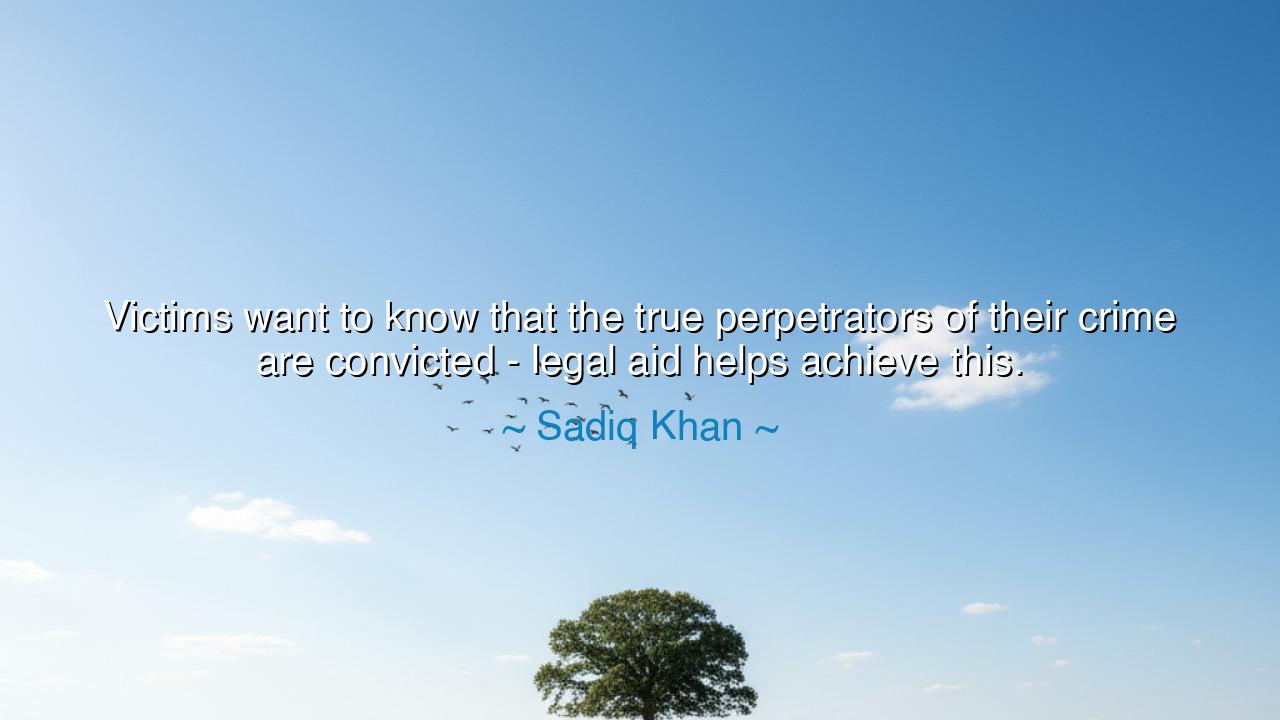
Victims want to know that the true perpetrators of their crime
Victims want to know that the true perpetrators of their crime are convicted - legal aid helps achieve this.






When Sadiq Khan declared, “Victims want to know that the true perpetrators of their crime are convicted — legal aid helps achieve this,” he spoke not only as a politician, but as a man shaped by the heart of justice itself. Beneath these words lies a profound truth: that justice is not merely the punishment of the guilty, but the protection of the innocent and the vindication of those who suffer. Khan, once a human rights lawyer before becoming the Mayor of London, understood that a society’s moral strength depends on whether the weak can stand before the law with the same power as the strong. To him, legal aid was not charity — it was the soul of fairness made flesh.
The origin of this statement lies in Khan’s defense of public legal funding in the United Kingdom, at a time when it faced cuts and neglect. He saw that when legal aid is weakened, the scales of justice tilt, not toward truth, but toward those with wealth, influence, or cunning. And in that imbalance, both victim and accused suffer — for if the wrong person is convicted, the true perpetrator remains free, and the victim remains wounded in spirit. Thus, his words remind us that justice without access is no justice at all. It is merely a shadow — a courtroom that speaks of equality but practices exclusion.
In his quote, Khan lifts the veil from an often-forgotten truth: that justice is a shared endeavor between law and compassion. He reminds us that the process of conviction is not only a matter of guilt and evidence, but of trust. The victim must trust that the system seeks truth rather than convenience, that their pain will not be compounded by error. When legal aid is strong, every accused is defended fairly, and every victim gains confidence that the verdict is righteous. This is not softness toward the guilty, but faithfulness toward the truth.
History offers countless warnings of what happens when justice is denied by poverty. In ancient Athens, only those who could afford eloquent advocates could stand tall before the courts, while the poor often fell prey to manipulation. Centuries later, in the dark days of Europe’s inquisitions, accusations alone could destroy lives because there was no fair defense, no advocate for the voiceless. Even in modern times, miscarriages of justice have been born from the absence of proper counsel — the innocent condemned while the guilty walked free. Khan’s words, though spoken in a modern age, echo the ancient principle of equality before the law — a principle that civilizations rise or fall upon.
Consider the story of the Guildford Four, wrongfully convicted in 1975 of bombings they did not commit. They were imprisoned for fifteen years before the truth emerged. Had they received proper legal support, the flaws in the evidence would have been exposed earlier, and the real culprits might have faced justice. This tragedy illustrates precisely what Khan warns against: that when legal aid falters, so too does the public’s faith in justice. For the victim of a crime, there can be no peace when doubt clouds the verdict. And for society, there can be no stability when truth becomes the privilege of the wealthy.
Khan’s message carries not only the weight of law but the tenderness of empathy. He sees that behind every case number is a human being — someone broken, grieving, seeking not vengeance, but assurance that wrong will be set right. His words remind us that legal aid is not simply a tool for the accused, but a mirror of our collective humanity. A state that protects only those who can pay abandons its duty to the moral order of the world. For the law is sacred only when it bends toward the truth, not toward the treasury.
Let this, then, be the lesson passed to future generations: justice must be accessible, or it ceases to be just. The poor, the voiceless, the frightened — they too must have champions in the halls of law. Let the people demand that their nations never measure justice by wealth, but by truth. And let every citizen remember that a fair trial, rightly defended, serves both victim and society alike. For when the innocent are protected and the guilty are rightly convicted, peace is restored, and the moral light of civilization shines once more — guided by the hand of legal aid, the humble yet powerful guardian of justice for all.






AAdministratorAdministrator
Welcome, honored guests. Please leave a comment, we will respond soon